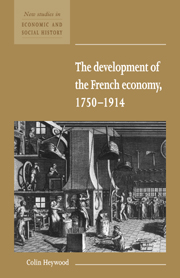Book contents
- Frontmatter
- Contents
- List of tables and maps page
- Note on references
- Acknowledgements
- 1 Introduction: the outlines of a debate
- 2 The performance of the French economy
- 3 Natural resources and the labour supply
- 4 Capital and technical progress
- 5 An agricultural revolution?
- 6 ‘The call of the markets’: the pressure of demand in the French economy
- 7 Social and institutional influences on development
- 8 Conclusion
- Notes
- Select bibliography
- Index
- New Studies in Economic and Social History
- Previously published as Studies in Economic History
- Economic History Society
1 - Introduction: the outlines of a debate
Published online by Cambridge University Press: 05 June 2012
- Frontmatter
- Contents
- List of tables and maps page
- Note on references
- Acknowledgements
- 1 Introduction: the outlines of a debate
- 2 The performance of the French economy
- 3 Natural resources and the labour supply
- 4 Capital and technical progress
- 5 An agricultural revolution?
- 6 ‘The call of the markets’: the pressure of demand in the French economy
- 7 Social and institutional influences on development
- 8 Conclusion
- Notes
- Select bibliography
- Index
- New Studies in Economic and Social History
- Previously published as Studies in Economic History
- Economic History Society
Summary
In 1789, France electrified the world with her revolutionary ideals, providing inspiration for generations of political radicals. During the 1800s, it was French military prowess that came to the fore, as the Napoleonic armies shattered the foundations of a whole series of regimes in continental Europe. And at the end of the nineteenth century, Paris could claim to be the cultural capital of the world: a Mecca for writers, composers and painters. But what of the French contribution to material progress? Was France as impressive in the creation of wealth as she was in these other fields? At first sight, somewhat paradoxically, it would appear not. Among contemporary observers, notably those from aristocratic circles who had tasted the delights of Paris and the Côte d'Azur, French people had the reputation of living above all for pleasure and frivolity. The English, by contrast, were known more for their ‘industriousness and plodding patience’ [23, 13; 66,1, 14–63]. Anyone interested in learning about the new industrial civilization emerging during the eighteenth and nineteenth centuries was therefore likely to go to England, or, later on, to the United States and Germany. Celebrated French exports, such as fine wines, perfumes and silks, also gave the impression of a country that was more agricultural than industrial, more attuned to an ancien régime of luxury and elegance than to the machine age [30, 470].
- Type
- Chapter
- Information
- The Development of the French Economy 1750–1914 , pp. 1 - 3Publisher: Cambridge University PressPrint publication year: 1995

